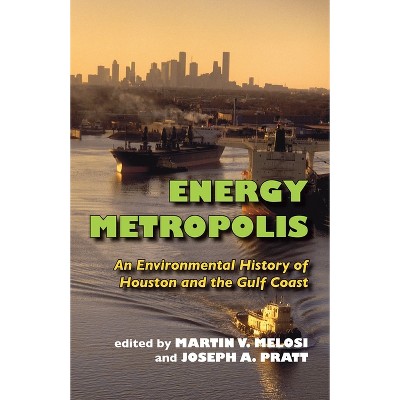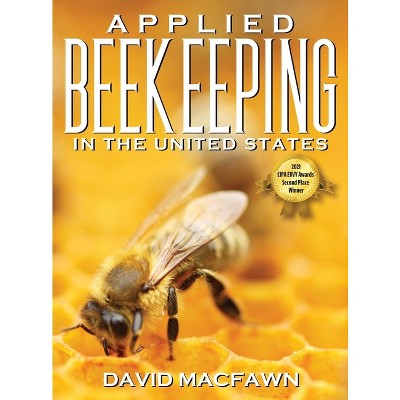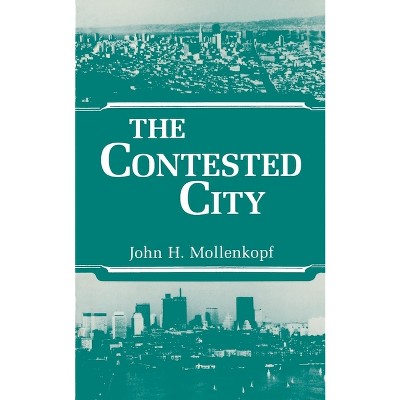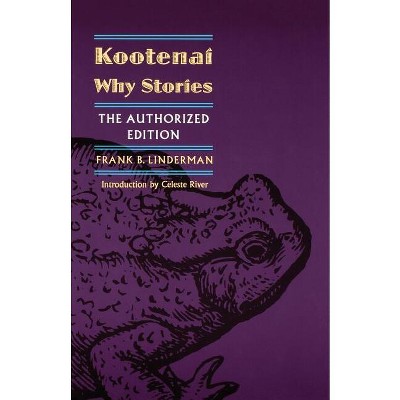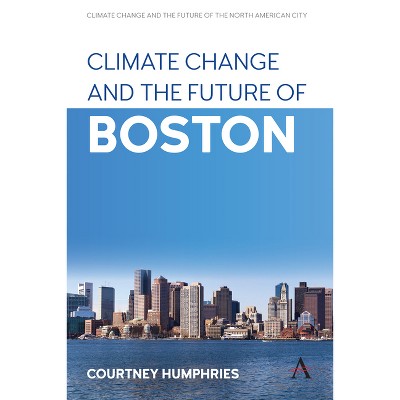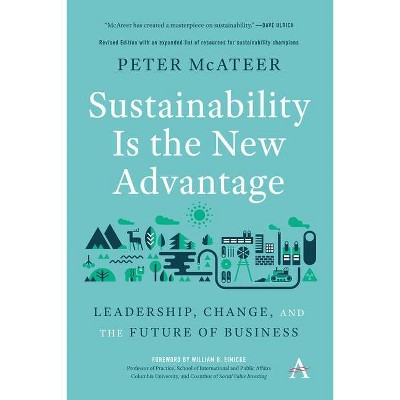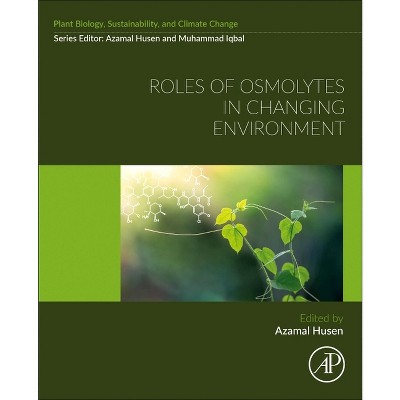Sponsored

Seattle and the Roots of Urban Sustainability - (History of the Urban Environment) by Jeffrey Craig Sanders (Paperback)
$55.00
In Stock
Eligible for registries and wish lists
Sponsored
About this item
Highlights
- Seattle, often called the u201cEmerald City, u201d did not achieve its green, clean, and sustainable environment easily.
- About the Author: Jeffrey Craig Sanders is assistant professor of history at Washington State University.
- 304 Pages
- Science, Environmental Science
- Series Name: History of the Urban Environment
Description
About the Book
Sanders examines the rise of environmental activism in Seattle amidst the "urban crisis" of the 1960s and its aftermath. Seattle's activists came to influence everything from industry to politics, planning, and global environmental movements.Book Synopsis
Seattle, often called the u201cEmerald City, u201d did not achieve its green, clean, and sustainable environment easily. This thriving ecotopia is the byproduct of continuing efforts by residents, businesses, and civic leaders alike. In Seattle and the Roots of Urban Sustainability, Jeffrey Craig Sanders examines the rise of environmental activism in Seattle amidst the u201curban crisisu201d of the 1960s and its aftermath. Like much activism during this period, the environmental movement began at the grassroots level--in local neighborhoods over local issues. Sanders links the rise of local environmentalism to larger movements for economic, racial, and gender equality and to a counterculture that changed the social and political landscape. He examines emblematic battles that erupted over the planned demolition of Pike Place Market, a local landmark, and environmental organizing in the Central District during the War on Poverty. Sanders also relates the story of Fort Lawton, a decommissioned army base, where Audubon Society members and Native American activists feuded over future land use. The rise and popularity of environmental consciousness among SeattleÆs residents came to influence everything from industry to politics, planning, and global environmental movements. Yet, as Sanders reveals, it was in the small, local struggles that urban environmental activism began.Review Quotes
Seattle and the Roots of Urban Sustainability . . . is going to be a lot of fun to teach because Sanders situates the Pacific Northwest's largest city in a dynamic context, at once local, regional, and national in scope; carefully tracks how its citizenry variously responded to opportunities to reconstruct their community . . . and offers astute assessments of Seattle's ambitious, self declared claim to be the American Ecotopia. Look no further, then, if you seek a primer on the melding of environmental and urban history . . . or a sophisticated analysis of late twentieth century grassroots politics.-- "The History Teacher"
In recovering stories that have almost faded from official civic consciousness and by connecting local concerns to national trends, Sanders negotiates the boundaries between hope and failure, "boosterism and criticism. . . . this is an outstanding case study of the tensions inherent in urban environmentalism. For scholars and activists alike, it is an important, rich, and unsettling work.-- "Pacific Historical Review"
Jeffrey Sanders makes a significant contribution to environmental and urban history by exploring how environmental activism and activities emerged in the famously 'green' city of Seattle around urban issues and within the context of changing big city neighborhoods.-- "Carl Abbott, Portland State University"
Sanders aims to show how contemporary ideas and practices of urban sustainability were expressed and engaged decades earlier, and in the process helps to answer how and why Seattle and its immediate region developed during the latter half of the twentieth century. This beautifully written and organized work will serve sociologists who study social movements, cities, and communities, environmentalism, and political sociology.-- "Contemporary Sociology"
Sanders finds the roots of both strengths and contradictions of the modern-day sustainability movement in his history of urban activism through neighborhood preservation, food production and consumption, and urban redevelopment. . . Far from being a narrow study of [Seattle], this engaging book deserves a wide readership among scholars interested in the history of environmentalism, cities and the urban environment, and postwar political activism.-- "Western Historical Quarterly"
Sanders focuses on homegrown institutions that confronted social and environmental injustices. In this way, his work creates an important bridge to studies of postwar liberalism, urban reform, and its discontents . . . a welcome addition to urban, environmentalism and political histories of postwar America.-- "Environmental History"
Sanders offers a vivid and compelling history of environmental activism in Seattle. His work is resourceful and well synthesized. It is an exciting story, without being overly nostalgic . . . one likely to inspire many to support and lobby for healthy and humane neighborhoods in their own communities.-- "H-Net Reviews"
Sanders's story of Seattle is the story of global environmental movements. His crisp narrative is a memorable contribution to environmental history, urban studies, urban sociology, and the social movement literature.-- "CHOICE Magazine"
Well-researched . . . a good primer on how [Seattle's] complex politics came to be.-- "Strange Bedfellows"
With lucid prose and engaging examples, Jeffrey Sanders offers a case study of Seattle, where a diverse group of people combined to generate an inordinate number of enduring reforms. He shows that many of the practices we associate with sustainability emerged between 1965 and 1985, and did so with special force in urban neighborhoods, where individuals were united by concern for their immediate surroundings and as consumers of resources. This book urges that we pay as much attention to cities as we do to wilderness, forests, and national parks, and as much attention to the local as we do to the global.-- "John M. Findlay, University of Washington, Seattle"
About the Author
Jeffrey Craig Sanders is assistant professor of history at Washington State University.Dimensions (Overall): 8.9 Inches (H) x 5.9 Inches (W) x .9 Inches (D)
Weight: 1.0 Pounds
Suggested Age: 22 Years and Up
Series Title: History of the Urban Environment
Sub-Genre: Environmental Science
Genre: Science
Number of Pages: 304
Publisher: University of Pittsburgh Press
Format: Paperback
Author: Jeffrey Craig Sanders
Language: English
Street Date: February 15, 2012
TCIN: 94136691
UPC: 9780822962106
Item Number (DPCI): 247-18-7123
Origin: Made in the USA or Imported
If the item details aren’t accurate or complete, we want to know about it.
Shipping details
Estimated ship dimensions: 0.9 inches length x 5.9 inches width x 8.9 inches height
Estimated ship weight: 1 pounds
We regret that this item cannot be shipped to PO Boxes.
This item cannot be shipped to the following locations: American Samoa (see also separate entry under AS), Guam (see also separate entry under GU), Northern Mariana Islands, Puerto Rico (see also separate entry under PR), United States Minor Outlying Islands, Virgin Islands, U.S., APO/FPO
Return details
This item can be returned to any Target store or Target.com.
This item must be returned within 90 days of the date it was purchased in store, shipped, delivered by a Shipt shopper, or made ready for pickup.
See the return policy for complete information.
Frequently bought together
Guests also viewed

$16.33
MSRP $21.99
Buy 2, get 1 free select books, music & movies
5 out of 5 stars with 1 ratings

